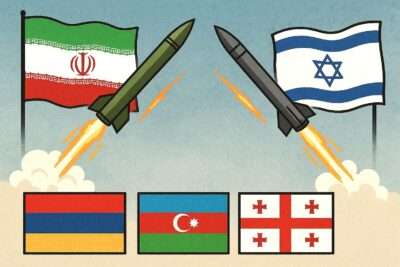
Israel’s Strike on Iran: The Conflict Intensifies
Kehidupan di perantauan • 21 Juni 2025
On Friday, June 13th, 2025, the world was shocked by Israel’s sudden airstrike on Iran. According to reports from the Iranian Ministry of Health, the attack, which lasted until Monday, June 16th, 2025, resulted in at least 224 deaths, 90% of whom were civilians. This attack not only caused numerous casualties but also sparked escalating tensions in the Middle East.
Is Iran Preparing a Nuclear Bomb?

The Israel-Iran conflict began with Israel’s accusations that Iran was preparing to develop a nuclear bomb. According to a report from Al Jazeera, the International Atomic Energy Agency (IAEA) revealed that Iran had violated the Nuclear Non-Proliferation Treaty (NPT) by enriching uranium to 60%—a level dangerously close to the 90% purity required for nuclear weapons. However, Iran strongly denied these allegations, claiming that its nuclear program is for peaceful purposes, such as electricity generation. Despite this, Israel proceeded with the airstrike as a preventive measure to ensure Iran does not develop nuclear weapons.
Iran’s Retaliation and Israel’s Ongoing Strikes
Unable to watch their capital, Tehran, in ruins due to Israel’s airstrikes, Iran responded with a series of drone and missile attacks on the night of Friday (June 13, 2025) and the morning of Saturday (June 14, 2025), targeting key strategic sites across Israel. In turn, Israel continued its relentless assault on Iran, striking over 200 military and nuclear facilities across the country.
This was not the first time such an attack had occurred. The previous year, Israel had carried out a major strike on the Iranian Embassy in Damascus, which led to the deaths of three senior Iranian commanders. These ongoing assaults have only deepened the already deteriorating relationship between the two countries.
The History of Israel-Iran Relations
The relationship between Iran and Israel has long been strained. Since the Iranian Islamic Revolution in 1979, Iran has severed diplomatic ties with Israel. It transformed the Israeli embassy in Tehran into the Palestinian embassy, symbolizing a major shift in Iran’s foreign policy. Since then, Iran has viewed Israel as its primary adversary, particularly regarding Palestinian issues and the geopolitical tensions in the Middle East.
The tensions between Israel and Iran do not appear to be resolving anytime soon. Attacks persist, with both sides firmly holding onto their positions and claims. The international community is closely monitoring the situation, aware of the far-reaching consequences, not just for the two countries, but for regional stability and global peace. As the cycle of retaliatory strikes intensifies, prospects for reconciliation grow slimmer, and the future of their relationship becomes increasingly unpredictable.
